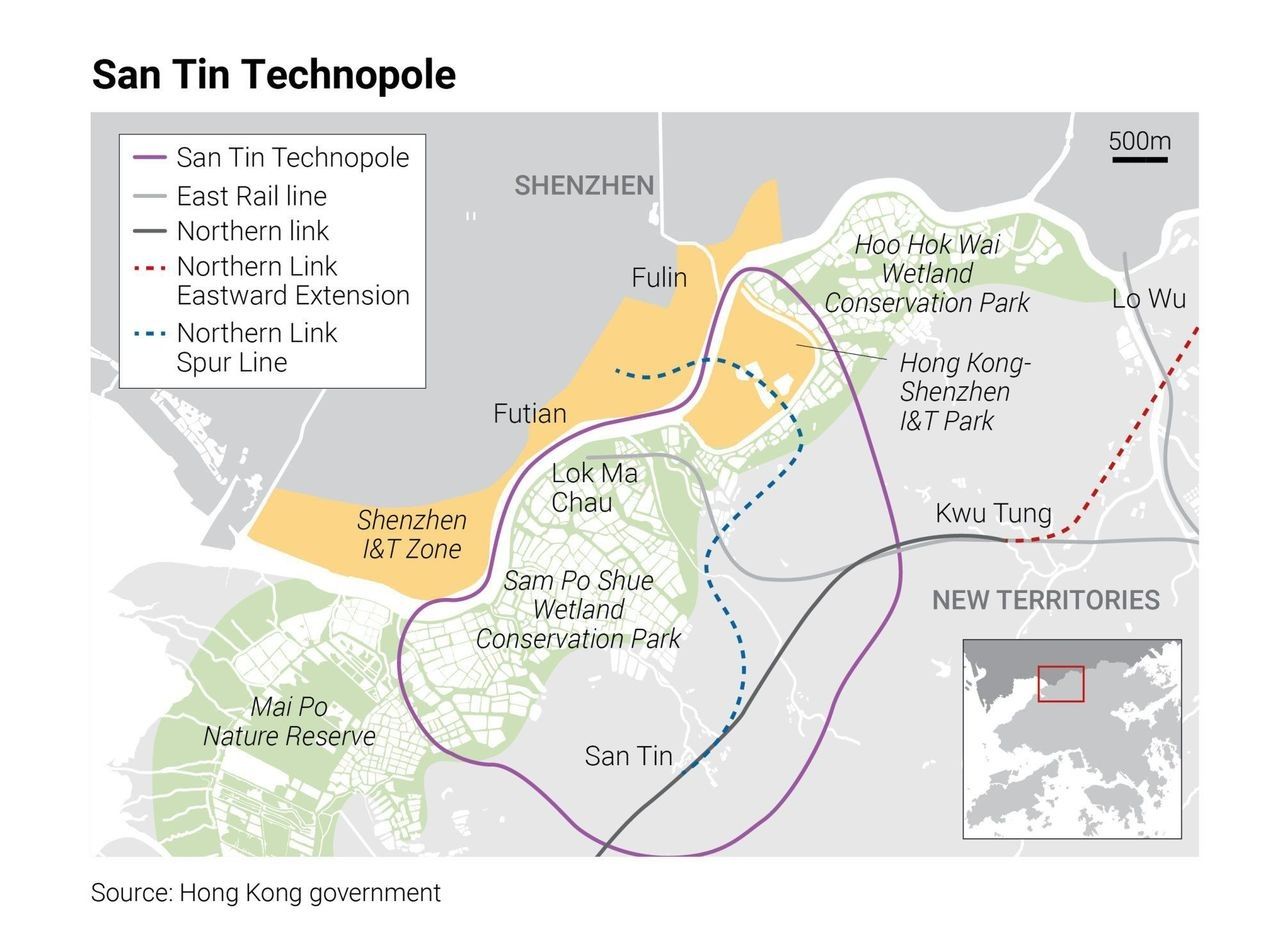
How a focus on human ‘software’ can help Hong Kong outdo Silicon Valley
From oyster farming to hi-tech clusters, the rural region of San Tin along the Hong Kong-Shenzhen border has gained fresh cachet for its proposed role in powering future economic growth. In her 2021 policy address, Chief Executive Carrie Lam Cheng Yuet-ngor made a bold suggestion that the futuristically named “San Tin technopole” could become the Hong Kong version of Silicon Valley.
Synergies with Shenzhen, existing supply chains in the Greater Bay Area, access to mainland China and international markets – all these suggest the coming tech hub could be even greater than Silicon Valley. And why not? Hong Kong’s vision should not be limited by Western precedents.
Invoking Silicon Valley is too simplistic, though. Admirers tend to discount the formative role of military contracting, the generations of computer pioneers and the historical advantages of the US dollar. The components of its world-leading technology ecosystem are widely studied, from its geography and Stanford’s research facilities to the role of venture capital.
Beyond tangible assets, a key success factor is the culture of challenging convention. It must be remembered that this also includes bypassing laws and ignoring negative social consequences of products.

Current planning is heavily hardware-focused. The consolidation of the Shenzhen-Hong Kong innovation and technology cooperation zone, comprising the Lok Ma Chau Loop and San Tin, is driven by land use planning, physical connectivity and infrastructure investment.
It reinforces the primacy of property and finance, which have long outstripped entrepreneurship and creative pursuits in Hong Kong’s economy.
The “software” is essential enabling factors such as a vibrant local talent base, seamless cross-border collaboration and entrepreneurial culture. Seeing technology as a means to accelerate an era of ecological civilisation can also be a game changer. These are areas our team at the Global Institute for Tomorrow are examining as part of our Hong Kong Young Leaders Programme.
Hong Kong possesses many assets. In 2020, it was ranked among the world leaders for top scientists in computer science and electronics. Access to capital is unquestioned. Hong Kong has become the largest biotech fundraising hub in Asia and second-largest globally.
Hong Kong Exchanges and Clearing’s reforms for listing pre-revenue biotech companies have allowed early-stage start-ups to secure capital investment from international markets. Similar provisions could be made for other strategic sectors.
Commercialising basic research for practical application, however, is a missing element. The existing Data Technology Hub and forthcoming industrial estates will provide advanced facilities for smart production and high value-added manufacturing.
These are steps in the right direction. But the “software” needed is a culture of problem-solving – from training conceptual thinking to incentives for professors to transfer their research to new businesses.
Silicon Valley knows problem-solving. Google made information more searchable, Amazon made shopping instantaneous and Uber provided mobility where public transport was absent. Some problems were simply invented, such as Facebook monetising human attention.
Imitation is not flattery in this case. Tech innovators in Hong Kong and the Greater Bay Area should aspire to do better.
There is no shortage of problems to be solved. The government has proposed six areas of technological focus: health care, big data and artificial intelligence, robotics, new materials, microelectronics and financial technology.
Seen through the lens of ecological civilisation, some breakthrough apps might include data analysis for climate adaptation, material science for low-carbon construction and AI to foster cross-cultural understanding. Expect revolutions in established industries such as health care, aviation, logistics and education.
Creating new business models to solve society’s most pressing problems can be a role for the “technopole”. Problem-solving, led by local talent, will form the bedrock of this ecosystem. While some talents will be drawn from other regions, there is no substitute for an engaged, capable local workforce, the essence of industry “software”.
Technology careers must compete favourably against other professions such as banking, law, consulting and medicine. Young professionals need greater entrepreneurial spirit, resilience and appetite for risk. Given sky-high living costs, it will require familial support in addition to targeted government financial support.
Close collaboration with others in the Greater Bay Area calls for greater exposure and pragmatism. It is no secret that many in Hong Kong have been slow to engage north of the border.
Former chief executive Leung Chun-ying recently said Hong Kong has just five years to avoid missing its last window of opportunity. An urgent mindset shift is perhaps the most critical “software” to be engineered.
Are Hong Kong’s young professionals up to the challenge? They will need to guard against parochialism, becoming too comfortable or inward-looking and disengaging from the wider world.
Reform of the education system should prioritise international views – more creativity, less conformity. Aversion to studying and working in mainland China and elsewhere in Asia and Africa should be challenged. These are the markets of the future.
Hong Kong is perfectly positioned in the world’s most populous and economically dynamic region. Historical strengths cannot be taken for granted, though. International connectivity, institutions of law and governance and excellence in corporate service demand continual reinvestment. Without focused attention, there is no guarantee these will remain best in class.
Rival technology hubs including Singapore and Dubai are rapidly developing capabilities. Shenzhen already has a detailed blueprint complete with policy packages and points for development. Hong Kong technology professionals will have the privilege of world-class hardware. A vision for the Northern Metropolis needs software in equal measure.











